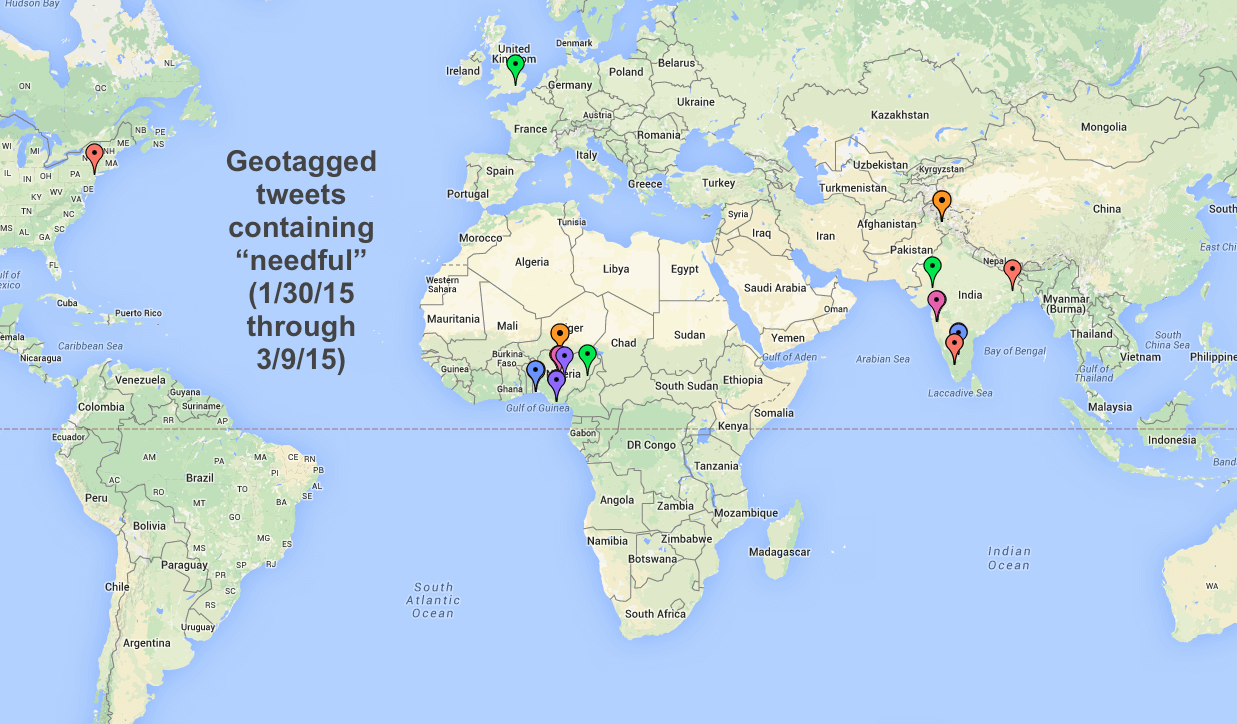Doms wrote in with an interesting question that touches on both Latin and global English.
He said, “In the Philippines, monthsary is widely used to refer to a ‘month anniversary.’ It is not a word, of course. What is a better term for marking an occasion that is celebrated every month?”
Doms’s question brings up what’s called “world English,” “international English,” “global English,” or “Globish.”
We’re more interconnected today than we were 20 years ago, so we are more likely to hear other people’s versions of English today, and there are also more English speakers outside the countries that people traditionally think of as English-speaking than there are in those countries. People in India, China, the Philippines, and so on learn English for business purposes and outnumber Americans, Canadians, Britons, and Australians, and they’re having their own influence on the language.
For example, recently a friend posted on Facebook that she had received an e-mail from a client’s accountant asking for “updation” of her business’s tax information.
It’s kind of like when you’re playing Scrabble and you realize something really should be an English word because it fits with patterns and you have all the letters, but it isn’t actually a word. These so-called “foreign” English speakers don’t always let themselves be reined in by “real” words, and updation is an example that seems to have caught on in India. If you can talk about creation, insertion, and deletion, why not updation?
So that brings us back to Doms’s question about monthsary. When you search the Internet, you quickly see that couples in the Philippines love to celebrate the months that they have been dating, and they sometimes exchange monthsary cards and gifts.
It’s heartening that they realize anniversary isn’t an appropriate word to use for a monthly event. That’s a problem I hear all the time in the United States. People will refer to their six-month anniversary, but as I’ve covered before, the origin of anniversary comes from two Latin words–annus which means “year,” and vertere which means “to turn.” So an anniversary is the turning of a year—not something that should be attached to months.
I was surprised that people in the Philippines use monthsary instead of monthiversary, which seems easier to say to me, but to answer Doms’s question, there is no better word, and monthsary is already popular in the Philippines and seems quite useful. It’s a great example of global English, and the new word fills a real gap in the language.
Here are some other words or phrases that have emerged in places such as India:
Prepone. If you move a meeting back, you postpone it, so the logical extension in India is that if you move a meeting forward, you prepone it.
- Very good news to movie lovers & #Karthi fans! #Komban movie release date prepone frm 2nd April to 27th March @StudioGreen2 @DF040714
- — b.sakthivelan (@sakthivelan_b) February 19, 2015
Do the Needful. In both India and Nigeria, if you’re asking someone to do something important—to do something that is needed—you may ask them to “do the needful.”
- The President should ignore the warmongers & do the needful by conducting free & fair elections & if he wins ok or fails, home sweet home!
- — Dele Momodu (@DeleMomodu) March 17, 2015
Revert. In India and some South Asian countries, you can ask someone to revert to you when you mean you want them to get back to you. For example, “Please send us your contact information so we can check and revert back to you.”
- Anyone who has #youtubefanfest passes happening in Mumbai and cannot go to due to certain circumstances please revert back! Thank you! 🙂
- — meher (@meherkothari) March 16, 2015
Co-brother. In Indian English, there are also more nuanced words for family relationships than we have in American English. Here, both my husband and I would call my sister’s husband our brother-in-law, but in Indian English, I would still call him a brother-in-law, but my husband could call him a co-brother.
- #Visakhapatnam Man beaten to death: A man was allegedly beaten to death by his co-brother and his family members… Click to check for reference
- — Muthu Krish (@MK_MuthuKrish) March 14, 2015
Timepass. Timepass has also emerged in India as a word that means “passing the time.” For example, “Twitter isn’t just for timepass; it’s for important things too.”
- Twitter is not just for timepass, it played crucial part in Narendra modi becoming PM, time to show our power #JusticeForDkravi
- — R.G.V (@varmanic) March 17, 2015
Some of those words, such as prepone, seem to fill a gap, and others are just a different way of saying something. I always find these fascinating, and if you know of other words, I‘d love to hear about them. The best way is to leave a comment here so other people can see it, but you can also post something to Twitter or the Grammar Girl Facebook page.
Note: Sarvani tells me that people in India say “back to pavilion” (a reference to the game of cricket) when Americans would say “back to square one.”
Note: I’m also told that a “rowdy-sheeter” is a person whose name is on the sheet of paper on police station notice boards for being rowdy.




